
What is the future for sex work?
Some say removing criminal bans will create safer environments for sex work; abolitionists say the sex trade normalises the use of vulnerable bodies.
The term sex work is used in place of prostitution as it covers all who provide sex-related services including adult film performers (porn stars), phone sex operators, webcam models, dancers in strip clubs, intimacy and anatomy coaches, and more.
In most countries, sex work is criminalized not only through banning the buying and selling of sex and sexual services, but also by forbidding the use of earnings from sex work and brothel-keeping as a source of livelihood.
While sex work has many gendered implications and has been described as a violation of women’s rights, many male and transgender sex workers also experience dual prosecution, and harassment because of laws that criminalize same-sex intimate relations.
Furthermore, sex workers as a whole are frequently penalized for non-criminal offenses such as loitering, vagrancy, impeding traffic flow and so on.
Decriminalisation
Advocates believe decriminalisation would mean sex workers are more likely to live without stigma, social exclusion, and fear of violence; that by recognizing sex work as work, their rights will be protected through conventional workplace health and safety standards.
Organizations such as UNAIDS, WHO, Amnesty International, Human Rights Watch and UNFPA have called on states to decriminalize sex work in the global effort to tackle the HIV/AIDS epidemic and ensure sex workers’ access to health services.
New Zealand and Australia are two jurisdictions known for their decriminalized sex industries. Here, sex workers can access safer working conditions and use the justice system to seek redress for discrimination and abuse.
The arguments for decriminalisation are that it:
Improves access to justice and challenges enforcement abuse- Sex workers have to deal with the threat of arrest, physical and sexual assault, public humiliation and extortion from law enforcers and sex buyers. Decriminalisation would place sex workers in a position to register complaints against police and buyers who act unlawfully, and bring offenders to justice without fear of negative consequences.
In countries such as New Zealand, sex workers have increased ability to screen clients, work in safe areas with better access to security services and report cases of violence.
Respects human rights and dignity– Human rights for sex workers cannot be fully realized as long as criminal laws block their access to justice, health, and social services, or undermine their right to labour and workplace protections. These laws also simultaneously expose them to violence, discrimination, and random arrest.
Effective responses to trafficking- Traffickers target the most vulnerable and marginalized including the homeless, poor, disabled, transgender, queer, or those in risky family situations. These same demographics are overrepresented in sex work because of a lack of access to formal work or lack of social programs to help build skills.
Sex workers are therefore natural allies who can help authorities identify trafficking victims or refer them to support services.
Durbar Mahila Samanwaya Committee in India is a sex worker-run self-regulatory board that “serves as a double-check to prevent the entry of minor girls and unwilling adult women into sex work, control the exploitative practices in the sector, regulate the rules and practices of the trade and institute social welfare measures for sex workers and their children.”
Improves access to health services- Decriminalisation enables access by outreach workers to brothels, financial support for sex worker health programs, and encourages sex worker collectives to organize appropriate, accessible and respectful health services for themselves.
Kenyan organisation Bar Hostess Empowerment & Support Programme (BHESP) is one such example of a collective attempting to ‘influence policy and facilitate provision of quality health services, human rights awareness, legal services and economic empowerment for sex workers, Women Who Have Sex with Women (WSW), women using drugs and bar hostesses.’
Reduces risk of HIV and sexually transmitted infections- A study published in The Lancet determined that decriminalisation has the most potential of reducing HIV infections in sex work communities. Sex workers would be empowered to insist on condom use by clients and have better access to STI and HIV testing and treatment.
Challenges state control over bodies and sexuality- Decriminalisation acknowledges that all people have the right to privacy and freedom from undue state control over sex and sexual expression. Legislation against sex work restricts physical autonomy and is a form of state control over the bodies of the demographics that make up the sex workers of the world.
However, But and Also…
Despite the numerous advantages of decriminalisation, it does not tackle the basic premise that it is impossible to commodify consent, especially when dealing with an industry made up of vulnerable bodies. In so long as the majority of sex work is motivated by poverty, vulnerability and lack of opportunities, it will remain an oppressive and abusive industry.
This premise means that sex work is not just a private and individual exchange between two consenting adults; it is largely the result of vulnerable bodies forced or coerced into it by circumstances and/or sex traders.
Decriminalisation thankfully does encourage safer conditions for sex workers who are otherwise denied basic human rights.
Do you think sex work should be decriminalised?

should not be decriminalize…
should not be decriminalize,because this is how some people earn a living furthermore its mother their will to do so-may be it’s conditions that have forced them-.None of them is always happy doing sex work in case you interview one of the victims
That it is how some people…
That it is how some people make a living is exactly one of the reasons why we should decriminalize, don’t you think?
Hello Anonymous, thank you…
Hello Anonymous, thank you for reaching out to us. How old are you and what do you mean by overage?
l lve sex
l lve sex
Me too! Continue enjoying…
Me too! Continue enjoying and don’t be afraid to experiment.